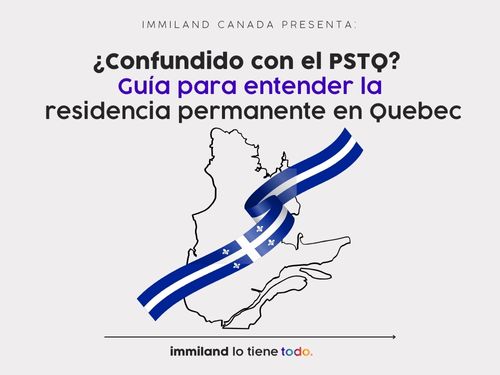Confused with PSTQ?

.jpg)
Getting permanent residency in Quebec through the PSTQ (Skilled Worker Selection Program) is a somewhat complex process to understand, even more so after the recent changes and programs paused by the provincial government.
That's why today I will share a special guide to understand the options Quebec offers when applying for permanent residence, how the selection program works, what factors and scores determine eligibility and where to find a specialized immigration service in the province. Read with me to the end and discover the answers you've been looking for. Let's get started!
What is PSTQ and why does it generate so many questions?
The PSTQ is Quebec' s Skilled Worker Selection Program for foreigners who wish to settle in Quebec permanently and work. Over time, this program has gone through significant changes that have caused a lot of uncertainty, especially the temporary suspension of streams whose applications used to be quite predictable such as the PEQ programs (Programme de l'expérience québécoise, known as the Québec Experience Program).
Quebec has its own immigration rules and priorities, and these are very different from those of the federal government of Canada. This is the first reason why it is confusing to think that the processes, programs and eligibility criteria are the same as those that apply to the rest of the provinces.
How does the PSTQ work for permanent residency?
The PSTQ works in two distinct stages: the provincial stage, where Quebec selects you, and the federal stage, where Canada grants you residency.
Stage 1: Selection by Quebec (obtaining the CSQ)
- Declaration of Interest in Arrima: The process starts when you submit your profile in the candidate pool of the online platform: Arrima, which is used by the Quebec government to provide a wide range of services to foreign nationals wishing to immigrate to the province.
Here, your data (education, experience, age, French, etc.) are evaluated in order to assign you a score. It is important to know that it is not only a matter of obtaining a high score, but also of meeting the selection criteria that Quebec prioritizes in its lotteries, such as fluency in French or a validated job offer in a specific area or sector.
- Invitation and CSQ application: If your profile is selected, you receive an invitation to apply for the Certificat de sélection du Québec (CSQ). This document is the province's official approval for your immigration. With the invitation, you submit a complete dossier and pay the corresponding fees.
Keep in mind that the declaration of interest is not an application to the CSQ, it only becomes tangible once you are invited and selected. This is why you should work on understanding and improving your scores in order to have a better chance of selection.
Stage 2: Application with the federal government (permanent residence)
Once you receive your CSQ, you may proceed to the federal stage.
- IRCC Application: The CSQ allows you to apply for permanent residence with Immigration, Refugees and Citizenship Canada (IRCC).
- Final Checks: The federal government's role is to conduct final admissibility checks. This includes medical examinations, criminal background and security checks for you and your family.
The PSTQ is, in essence, the gateway to immigration to Quebec. The CSQ is the key document certifying that the province has chosen you. After obtaining it, approval of permanent residence by the federal government is, in most cases, a final administrative step, provided all admissibility requirements are met.
PSTQ Currents
The PSTQ is not a single program, but is divided into different streams designed to attract international graduate students and skilled temporary workers. Each stream has its own eligibility criteria, which include level of French, work experience and type of diploma obtained in Quebec.
The different categories or streams prioritize candidates based on their skills and work experience. These categories are aligned with Canada's National Occupational Classification of Occupations (NOC/TEER) and the province's immigration objectives.
The main currents of the PSTQ are:
- Category 1: Highly skilled and specialized skills
Aimed at professions classified as TEER 0, 1 or 2, which generally require a university degree or professional/managerial experience. Requirements include one year of relevant work experience within the last five years and a level of oral and written French CLB 7 and CLB 5, respectively.
- Category 2: Intermediate and manual skills
Applies to occupations classified as TEER 3, 4 or 5. These occupations usually require practical training or vocational diplomas. Requirements include at least two years of relevant work experience, one year of which must be in Quebec, and an oral French level of CLB 5.
- Category 3: Regulated professions
Intended for professionals in fields that require a specific license to practice in Quebec, such as health. Applicants must meet the province's licensing requirements in addition to French similar to the previous categories, depending on the applicant's TEER.
- Category 4: Exceptional talent
It focuses on candidates with unique skills or achievements that can significantly benefit Quebec's economy, culture or society. Although the minimum eligibility for this category does not ask for language, French is absolutely necessary to be competitive because of the points it gives.
If applying with a partner, the partner must have a minimum level of French CLB 4 in speech for all categories.
Eligibility factors and scores
Unlike Express Entry, Quebec uses a proprietary scoring system to select its candidates, which evaluates factors such as age, level of education, area of training, areas of hardship, work experience, regionality, and, most importantly, proficiency in French.
The minimum eligibility elements are only the initial requirement. To receive an invitation to apply for the Arrima sweepstakes, your profile must be competitive.
It is recommended to use the official tool of the Ministère de l'Immigration, de la Francisation et de l'Intégration (MIFI) for an accurate calculation of your score. See table (PDF) on the invitation criteria and your score.
Once you learn how to calculate your score in the Quebec system, you will be able to know how competitive your profile is and what factors you need to improve. Quebec's priority is to attract candidates who can contribute to the province's society and economy, with a particular emphasis on the French language.
Immiland Canada Immigration Services
To clarify your doubts and receive updated information about programs in Quebec and the rest of Canada, we invite you to explore our immigration services on the website: Immiland Canada.
In addition, the following links are available for applications in Quebec:
Thank you very much for reading, see you soon!
With love,
Immiland Canada
Note: This article does not constitute legal advice or legal opinion from an attorney. Rather, it is provided solely to inform readers about certain aspects related to the details of the law in legal matters.
























.jpg)